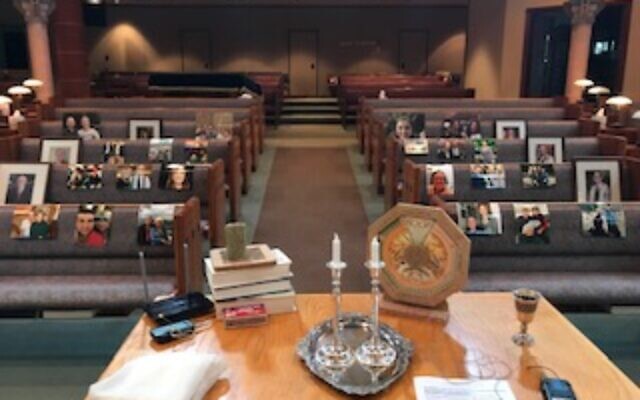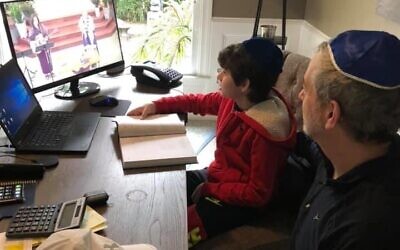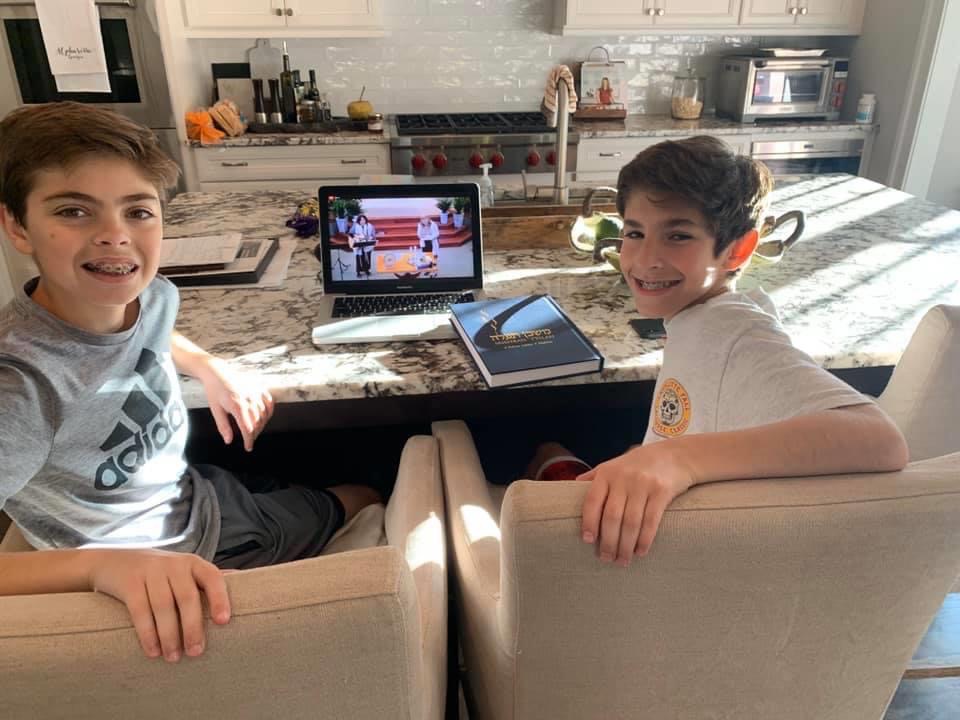Beth Tikvah Members Present, Even When Not
Even as they conduct Shabbat services online, the sanctuary seems a little less empty thanks to a creative approach to putting Jews in the pews.
Dave Schechter is a veteran journalist whose career includes writing and producing reports from Israel and elsewhere in the Middle East.

On Friday night and Saturday morning, as Rabbi Alexandria Shuval-Weiner and Cantor Nancy Kassel look over the sanctuary at Temple Beth Tikvah, they see the faces of congregants, some smiling and others appearing studious.
But how can this be? The doors to Beth Tikvah closed March 12 like those at synagogues throughout metro Atlanta, to thwart the spread of COVID-19.
After seeing a report on television about a church that taped photographs of its members to the pews, Shuval-Weiner thought doing the same at her Reform congregation might solve the “lonely feeling” she experienced that first Friday of live-streaming services from an empty sanctuary. “It was like talking in an echo chamber,” she said.
Kim Weindorf, Beth Tikvah’s director of outreach and marketing, sent an email asking members to send in photos, which she then had blown up so that they were visible from the bimah. The “congregation” continues to grow as more and more photos are received. “A couple of past presidents said, ‘Will you take my picture off the wall and put it in the sanctuary,’” Shuval-Weiner said.

“It’s wonderful; then the cantor and I, even though we’re talking into the ether, we can look and see the smiling faces of people we know and love and can’t wait to welcome back to the shul,” though when that will happen remains uncertain, Shuval-Weiner said.
“It makes such a big difference to see faces of people that I know that are probably at home looking at their computer screens and it just really helps because it just projects love and support and their desire to still be in community,” Kassel said, adding that her guitar helps fill the vacuum left by the absence of congregants’ voices.
Beth Tikvah uses a combination of live-streaming on its website and a live signal on Facebook to offer different views of Shabbat services. “For our people, seeing the sanctuary was a calming factor,” Shuval-Wiener said.

The absence of in-person worship has required a few modifications of the service. Kassel and Beth Tikvah’s gabbai Dr. Rick Winer each have at home one of the five Torah scrolls usually found in the ark, which they use to pre-record the weekly Torah portion. The congregants given aliyot send in a video recording of themselves reciting the prayers before and after the Torah reading, which are then played out over the live feed. Shuval-Weiner delivers her midrash and leads prayers from the bimah.
To accommodate a tradition in which Daniel Ellison, now in his 90s, annually reads from the Torah to mark the anniversary of his bar mitzvah, the congregation arranged for him to come into Beth Tikvah, masked and gloved, and, from a safe distance, recorded him reading from the scroll.
During Shabbat services, Shuval-Weiner’s husband Jay Weiner, retired after many years in the Jewish professional world, monitors the chat and engages with people posting comments, throwing out a question or encouraging a response as his wife conducts the service. What they did not expect was to find viewers hailing from elsewhere in the United States and in other countries.

The online experience allows “the ability to touch people where they are. There have been a few people who are shut-ins and they don’t have the ability to go out,” Shuval-Weiner said. “That brings them into this place of welcome, where they can commune with others. That’s made us really think about community from a more expansive place.”
The question Shuval-Weiner now asks is: “How do we not lose that?” when the Roswell congregation of slightly more than 400 family units eventually re-opens its doors. “This has provided us an opportunity to try some things [such as music instruments on Shabbat morning], that’s allowed for a richness we do not want to love,” she said. “I think we’ll be experimenting more. People will be more open to a more expansive way to engage with liturgy.”

As for when that will happen, no one knows, but rabbis tell the AJT that they are talking about this on conference calls. “We’re all trying to make sure that we understand best practices in this world we have never experienced before,” Shuval-Weiner said. “First and foremost, we want our community to be safe.”



comments